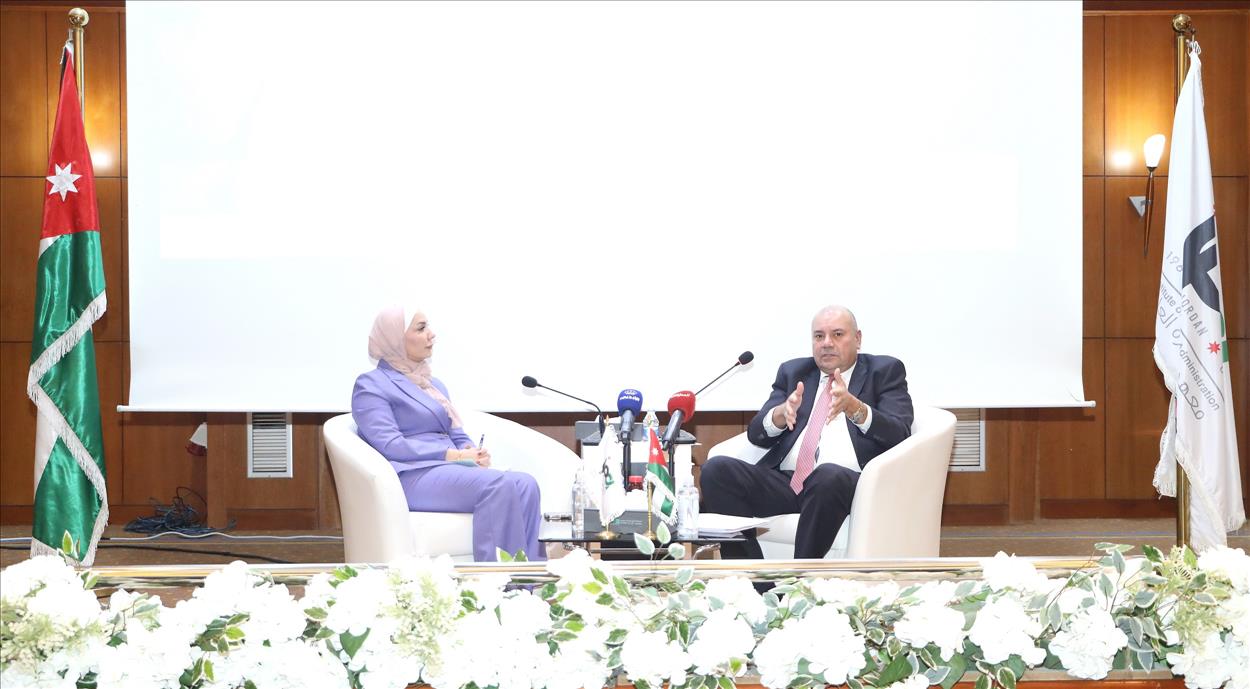
403
Sorry!!
Error! We're sorry, but the page you were looking for doesn't exist.
Jordan's Administrative Reform Complements Political, Economic Modernization-Minister
(MENAFN- Jordan News Agency)
Amman, Oct. 11 (Petra) – Minister of Political and Parliamentary Affairs Abdul Monem Odat said that Jordan's administrative reform process complements the political and economic reform tracks, reflecting the understanding that development cannot be achieved through decisions alone but through the ability to implement them efficiently and fairly.
Speaking during a panel discussion on Saturday, moderated by Director General of the Institute of Public Administration (IPA) Saham Al-Khawaldah and attended by a number of trainers in the "Professional Diploma in Policies and Public Administration" program, Odat emphasized that Jordan now has a genuine opportunity to strengthen good governance, combat bureaucracy, and empower young national talent to play a central role in modernization and institution building.
The Professional Diploma program, he noted, is implemented by the IPA under the Public Sector Reform Project, in partnership with the German Jordanian University, the Public Sector Reform Implementation Unit at the Prime Ministry, and in cooperation with the Italian Cooperation Project and the European Public Law Organization.
Odat stressed that Jordan's ongoing political modernization through the promotion of party life and expansion of popular participation in decision-making requires an administrative apparatus capable of keeping pace with this transformation and fostering trust between citizens and state institutions. "Effective administration," he said, "is the bridge that links policies to reality and ensures the continuity and sustainability of modernization."
He added that the current administrative modernization drive goes beyond restructuring or system development, extending to instilling a culture of public service, enhancing institutional performance, empowering skilled personnel, and advancing digital transformation to ensure citizens receive services fairly, promptly, and with high quality.
For her part, Al-Khawaldeh underscored that the convergence of political and administrative thinking enhances the efficiency of public work, noting that the Institute is committed to developing human capital and strengthening government leadership skills through specialized training and capacity-building programs, in line with national modernization and institutional empowerment goals.
The session featured an interactive discussion with participants in the diploma program on issues related to the role of political parties in building public trust, the importance of leadership empowerment, and skill development within the public sector.
This was the first in a series of planned sessions under the Professional Diploma program, which will include topics aligned with administrative, political, and economic modernization priorities. The diploma comprises around 500 training hours and aims to prepare qualified public employees to formulate, implement, and evaluate public policies, as well as to provide practical solutions to the challenges of modernizing the public sector.
Fifty participants from 29 government entities were selected for the program 42 percent male and 58 percent female based on transparent selection mechanisms and rigorous governance criteria.
Amman, Oct. 11 (Petra) – Minister of Political and Parliamentary Affairs Abdul Monem Odat said that Jordan's administrative reform process complements the political and economic reform tracks, reflecting the understanding that development cannot be achieved through decisions alone but through the ability to implement them efficiently and fairly.
Speaking during a panel discussion on Saturday, moderated by Director General of the Institute of Public Administration (IPA) Saham Al-Khawaldah and attended by a number of trainers in the "Professional Diploma in Policies and Public Administration" program, Odat emphasized that Jordan now has a genuine opportunity to strengthen good governance, combat bureaucracy, and empower young national talent to play a central role in modernization and institution building.
The Professional Diploma program, he noted, is implemented by the IPA under the Public Sector Reform Project, in partnership with the German Jordanian University, the Public Sector Reform Implementation Unit at the Prime Ministry, and in cooperation with the Italian Cooperation Project and the European Public Law Organization.
Odat stressed that Jordan's ongoing political modernization through the promotion of party life and expansion of popular participation in decision-making requires an administrative apparatus capable of keeping pace with this transformation and fostering trust between citizens and state institutions. "Effective administration," he said, "is the bridge that links policies to reality and ensures the continuity and sustainability of modernization."
He added that the current administrative modernization drive goes beyond restructuring or system development, extending to instilling a culture of public service, enhancing institutional performance, empowering skilled personnel, and advancing digital transformation to ensure citizens receive services fairly, promptly, and with high quality.
For her part, Al-Khawaldeh underscored that the convergence of political and administrative thinking enhances the efficiency of public work, noting that the Institute is committed to developing human capital and strengthening government leadership skills through specialized training and capacity-building programs, in line with national modernization and institutional empowerment goals.
The session featured an interactive discussion with participants in the diploma program on issues related to the role of political parties in building public trust, the importance of leadership empowerment, and skill development within the public sector.
This was the first in a series of planned sessions under the Professional Diploma program, which will include topics aligned with administrative, political, and economic modernization priorities. The diploma comprises around 500 training hours and aims to prepare qualified public employees to formulate, implement, and evaluate public policies, as well as to provide practical solutions to the challenges of modernizing the public sector.
Fifty participants from 29 government entities were selected for the program 42 percent male and 58 percent female based on transparent selection mechanisms and rigorous governance criteria.

Legal Disclaimer:
MENAFN provides the
information “as is” without warranty of any kind. We do not accept
any responsibility or liability for the accuracy, content, images,
videos, licenses, completeness, legality, or reliability of the information
contained in this article. If you have any complaints or copyright
issues related to this article, kindly contact the provider above.

















Comments
No comment